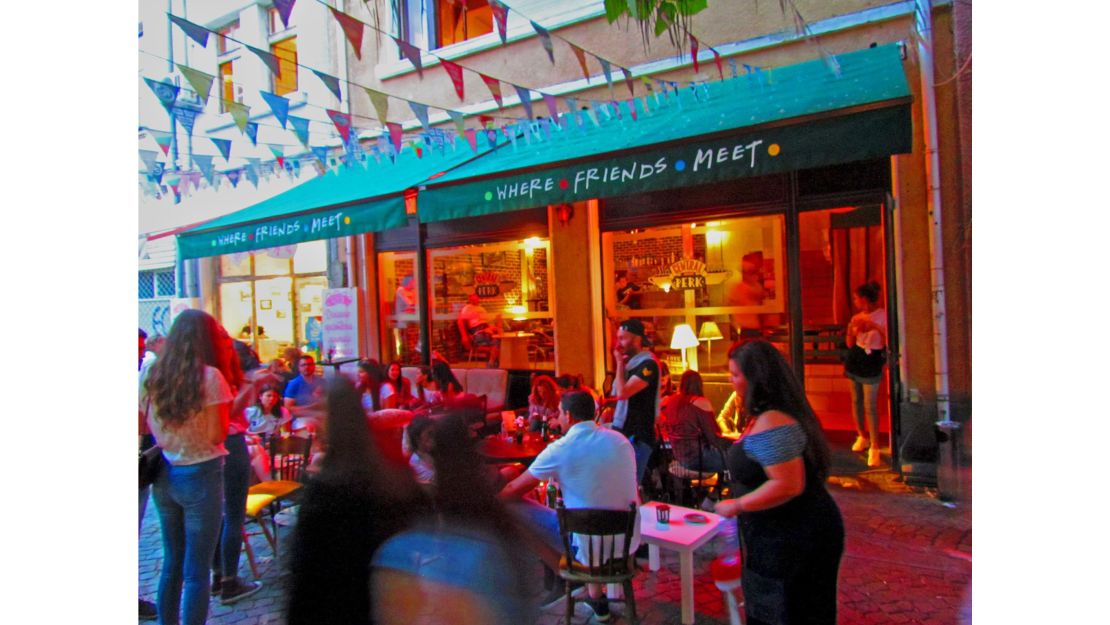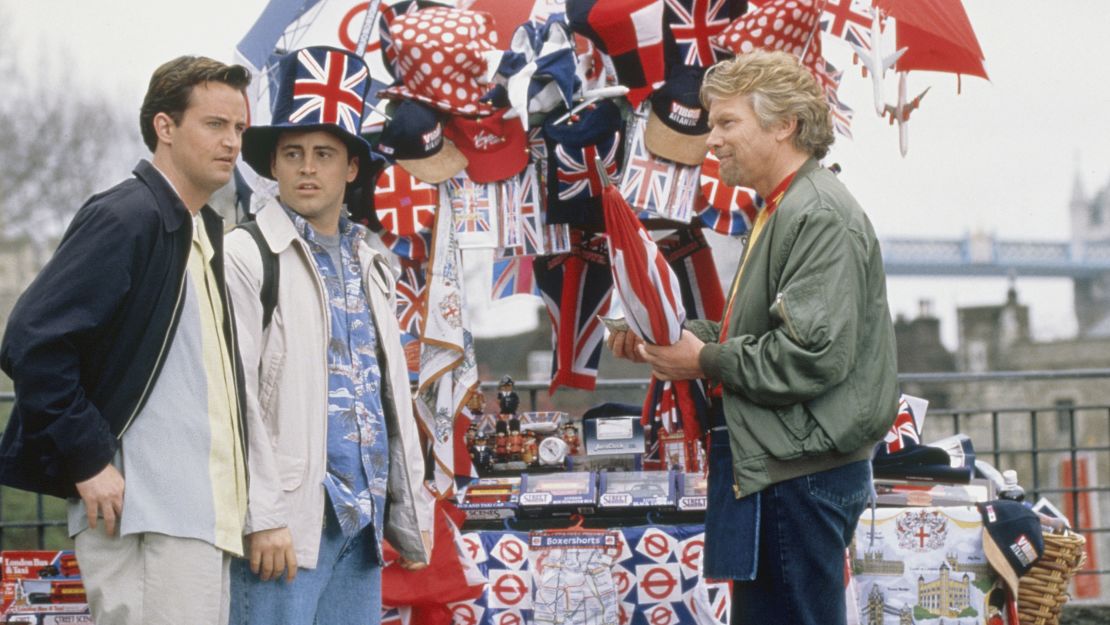For 17 long years, television’s six closest “Friends” and their die-hard fans around the world were on a break.
That ended Thursday, when the sitcom’s six cast members returned for a one-off special – a reunion millions of viewers had been feverishly demanding ever since the group turned off the lights and strolled out of their preposterously spacious Manhattan apartment for the last time.
But “Friends” had never really gone away. All one needs to do to understand the staggering global impact the show has had over the past three decades is to check in with its legion of obsessed, line-quoting fanatics. And OH. MY. GOD. Could there be any more of them?
“It became a show of the world – it wasn’t just a little TV pilot set in New York,” says Todd Stevens, a producer on “Friends” throughout its 10-year run, as he reflects on the moment those involved in the show realized they were making a global juggernaut.
“It did seem (to us) like the strike of lighting that was ‘Friends’ could be seen further than just the United States,” he says. “It got out of the neighborhood.”
He may be underplaying it. “Friends” was the first and only sitcom to truly, genuinely take over the world – and the world isn’t ready to let it go yet.
“I doubt we’ll ever see a sitcom appeal in the way ‘Friends’ did and still does,” says Pete Allison, whose podcast “Friends with Friends” delves deep into each of the show’s 236 episodes. “It’s far more embedded in our lives than most popular culture.”
Fake Central Perks still pop up in cities on every continent; online communities analyze every episodec, scene and joke; the show has become comfort viewing for a new generation through streaming services like Netflix; and all over the globe, there are people who learned to speak English by watching Ross, Rachel, Joey, Phoebe, Chandler and Monica.
For those uberfans, this week’s reunion was an emotional landmark. “I don’t cry very often, but my eyes were full with tears,” says Elin Nikolov, a 35-year-old from Bulgaria who channeled his love of the show into his work, by setting up a replica Central Perk cafe in the city of Plovdiv.
But it was far from the end. “I still watch it every day,” Nikolov says. “They’re my friends. Many ‘Friends’ fans will say that, but it’s the truth, and it’s great to see them every night and every day.”
‘We’re keeping the show alive’
“You can guess that I’m an enormous ‘Friends’ fan,” Nikolov tells CNN, speaking from the Central Perk replica cafe he set up eight years ago. And he says he’s not alone: “You have no idea. (There are) so many fans in Bulgaria.”
For him, building a “Friends”-themed cafe was the natural next step in his fandom – and he describes the project as “the best thing I’ve ever done.”
“We try to do every detail,” he says. It took some doing to replicate the world-famous Central Perk interior. “The couch was shipped from Belgium because I couldn’t find an identical one here, and we furnished it immediately because the color was not right,” he said.
“When we made it orange, it was an amazing feeling,” Nikolov says.

Now, the site has become something of a Mecca for Eastern European fanatics.
“Every day from different parts of the country, people come to take photos on the orange couch,” he says.
“Even in the nearby countries – from Romania, from Greece, from Macedonia, from Turkey. We have so many visitors just to sit on the orange couch.”
The cafe is one of many replica Central Perks in the world – the original is probably the most-copied television set ever built – and their existence is testament to the show’s enduring reach and money-making potential.
A British ‘Friends’ frenzy
Britain’s ever-hungry “Friends” fanbase has birthed an entire subculture of millennials who grew up watching the program on repeat. “It was ‘the thing’ everyone was watching after school,” podcast co-host Dave Cribb tells CNN.
“I think the fact that quoting ‘Friends’ is still one of the main ways our friendship group communicates in 2021 tells you all you need to know about how much of an impact it had.”
And that special relationship encouraged show bosses to bring “Friends” to London to film the series four finale – one of the first times a major American show had moved its entire production across the Atlantic.
“That whole experience was amazing,” Stevens, the producer, says, as he recalls exciting an entire pub by mentioning the show was in town to shoot. “The way it got around the pub, it was a buzz. It was contagious.”
“I don’t think I’ve ever been anywhere in the United States like that – ‘Friends’ was part of people’s families there, and I felt like I was being welcomed in,” he says.
“The crowds that were out there, and the paparazzi following us, it was insane.”

Stevens fondly remembers a long night while taping the episode.
“It was a little late, the production wasn’t exactly going as planned. So we said to the warm-up guy, ‘Do some ‘Friends’ trivia with the audience’ – and the fans stumped the writers on a couple of occasions,” he said.
“The fans in the UK were amazing,” he added. “We felt like rock stars.”
These days, Brits can get their “Friends” fix through one of the many immersive experiences on offer. When British retail giant Primark sought to bring new customers into their flagship store in Manchester, UK, they too built their own Central Perk inside the outlet.
“It was a natural extension” to the chain’s line of “Friends” clothing, Primark’s director of new business development Tim Kelly said.
And there’s FriendsFest, an annual touring festival that visits parks and arenas across the UK and draws 100,000 people each year. The event is one of many around the world to tout guest appearances from the show’s wide network of ensemble cast members, producers and writers.
“Each year it is a mix of people coming to the event for the real nostalgia element and also the younger generation who are watching it for the first time,” says Amanda Brown, the Head of PR at Comedy Central UK, which owns syndication rights to “Friends” and organizes the festival.
But for true megafans like Nikolov, the profitability of “Friends” is – as Joey might say – a “moo point.”
“It’s profitable, but not so much. But it’s not about the money, it’s about the love of the show,” he says. “It’s about promoting this great series and keeping it alive for a lot longer.”
Given the global diaspora of “Friends” addicts, that isn’t difficult. “Their eyes are wide open when they see the set up,” he said of his customers.
“They notice all the details – the arrows, the board where the drinks are written, the shape of the bar, the menus … It’s a great feeling to meet fellow ‘Friends’ fans, and discuss our favorite scenes.”
‘It helped me understand English’
“Friends” taught fans in every part of the planet to laugh, and occasionally to cry. But it can also lay claim to a particularly unique phenomenon – it taught a generation of non-native speakers English.
“It helped me to understand English a lot,” Nikolov says. “You learn real, everyday speech. When you go to school, maybe you learn the right grammar, to enunciate – but (on ‘Friends’) they speak real language, real street language,” he said.
“If you are able to understand every word on it, you will be able to speak the language,” he adds.
“When I became a huge fan, I watched it hundreds of times, and if there’s something I didn’t understand I Googled it. I know it word by word now.”
He’s not alone. A survey by Kaplan International Languages found that “Friends” was the show most widely used by people studying English. Millions of people still watch the video series “Learn English with ‘Friends’” on YouTube, and “the ‘Friends’ effect” has intrigued linguists for years.
Liverpool manager Jurgen Klopp is among those who say they honed their English by watching the sixsome’s romantic misadventures.
“It’s easy conversation. You can understand pretty much each word, pretty early,” he told BBC radio. And BTS star RM, whose real name is Kim Nam-joon, says the show played a big role in teaching him English, an anecdote he retold on the reunion special.
“Many of my friends who didn’t have English as their first language told me that it has helped them a lot,” adds Dutta Shibalika, a “Friends” fan in Kolkata, India, where the show has enjoyed enduring popularity.
“I used to watch with subtitles. It helped me a lot to understand the dialogues,” adds Shivesh Chauhan from Bangalore in southern India.
Melissa Baese-Berk, an associate professor of linguistics and director of the Second Language Acquisition and Teaching program at the University of Oregon, previously told CNN that the show fits three key measures for teaching English – it’s engaging, it has subtitles, and its storylines about the lives and loves of its six stars are repetitive enough to allow viewers to follow along easily.
And it’s given countless viewers a very particular, laid-back linguistic education.
“The script supervisor would build in some of those ‘ums’ and ‘errs’ because that’s what the actors were saying,” Stephens recalls. “They tried to capture the actors’ cadence in the script.”
He added: “(The show) kind of had its own language – that kind of coffee shop casualness, which was just coming into society.”
Nearly two decades on, people across the world are still speaking the language of “Friends.” And this week, they had the chance to listen to the six cast members all over again.
Many fans reveled in the trip down memory lane.
“I thought it was just really well done, a really nice blend of nostalgia and emotion, and it was great to see them all so genuinely moved by meeting up again,” Cribb, the podcast host, said.
“Our podcast listeners have really loved, judging it by the messages we’ve been getting.”
And for some, it came after 17 years of yearning for fresh material.
“I wanted so bad to have something new, and when I watched it, I knew that this is it. This is really it,” says Nikolov. “And now I don’t have anything.”
But for those involved in the show, the global outpouring it sparks – even in 2021 – is no surprise.
“There is a multigenerational relatability that the show tapped into,” Stevens says. “I think everyone on the show is moved by how much of a nerve it struck,” he adds.
“It is beautiful.”





